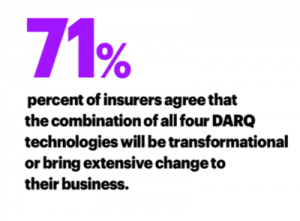Other parts of this series:
In order to navigate and thrive in a post-digital era, insurance companies will need to look beyond their organization’s current structures with a view toward shaping how governments, business partners, employees and individuals interact with the world using technology. To do so, they will need to consider every digital tool available to them––including those that are just emerging.
One of the most compelling and perhaps most important set of technologies every company will need is DARQ: distributed ledger technology (D), artificial intelligence (A), extended reality (R) and quantum computing (Q).
While each of these four technologies individually represent opportunities for insurance businesses to differentiate their products and services, when merged, they have the potential to open exciting pathways into the future.
DARQ will enable the post-digital era of business and technology, and those companies that want to be at the forefront of the industry would be wise to start now. For some, this means launching pilots or new ventures. For others, it means establishing relationships with technology companies and insurtechs, or acquiring start-ups with innovative technology.
PREPARING FOR DARQ
To take advantage of the transformational capabilities that DARQ technologies provide, insurance businesses must start to explore their potential in earnest.
 Already, AI and XR offer major competitive advantages––and distributed ledgers and quantum computing are expected to drive more innovations in the coming years. When all four technologies are viable at scale, their impact will accelerate significant change. Insurance companies that recognize the opportunity—and begin to explore possibilities and investments with strategic focus—will be leaders in a brand new competitive landscape.
Already, AI and XR offer major competitive advantages––and distributed ledgers and quantum computing are expected to drive more innovations in the coming years. When all four technologies are viable at scale, their impact will accelerate significant change. Insurance companies that recognize the opportunity—and begin to explore possibilities and investments with strategic focus—will be leaders in a brand new competitive landscape.
71 percent of insurers agree that the combination of all four DARQ technologies will be transformational for their business––and 86 percent of businesses are evaluating, piloting or have adopted XR in at least one business unit, whether it be through immersive learning or hands-on training for employees.
With that in mind, the Accenture Technology Vision for Insurance 2019 report identified four key questions insurance companies should ask themselves in order to get prepared:
- Is your digital foundation ready for DARQ?
Early DARQ projects will rely on SMAC practices (social, mobile, analytics and cloud), so for companies still in transformation mode, it is important to complete your ongoing digital change efforts. - Have you determined how your organization will access the DARQ technologies that are relevant for your business?
Make decisions on whether you will buy your AI tools or create your own––and establish relationships with leading quantum cloud vendors to explore new quantum computing capabilities as they are made available.
- How are you adding DARQ skills to your workforce?
As recruiting DARQ-experienced talent becomes more competitive, you may want to consider training programs to reskill your current employees and incentivize them to stay. - How can you use DARQ to shape the future of your industry?
Think about establishing forward-looking programs dedicated to scenario planning. It is also important to consider what DARQ technologies can be implemented today and what capabilities will be available in the future.

By bringing together this suite of valuable technologies, insurance companies will lay the foundation for the next generation of products and services. But DARQ is not the only consideration for the future. Consumers and their expectations are also key. In my next post, I’ll explore Accenture’s Tech Vision 2019 from the perspective of the client.
To read more about Accenture Technology Vision for Insurance 2019, you can download it here. I also encourage you to visit the Accenture blog, where I have several more series on everything from the internet of thinking to the power of data-driven AI.











